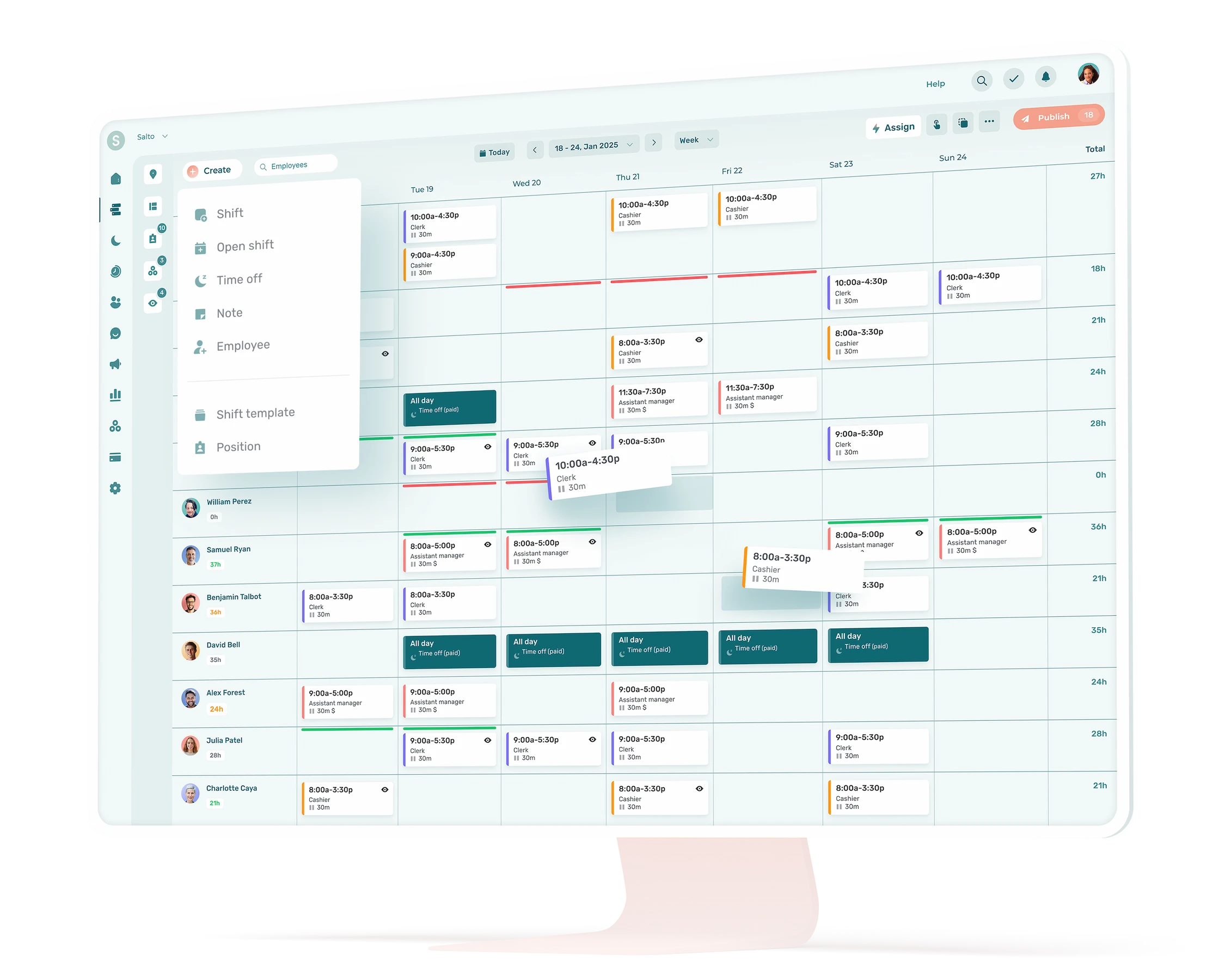Several qualities set an average employee apart from a good one—or even an exceptional one. As a manager, being able to identify these traits is essential for making informed hiring decisions and supporting your employees’ growth within your organization.
Of course, the qualities of a good employee can vary slightly from one industry to another. However, most standout employees tend to share similar traits.
In this article, you’ll learn more about the key qualities of a good employee, the benefits of recruiting and retaining them, examples of traits to look for, and how to identify them effectively.
What Defines a Good Employee?
A good employee is someone who is engaged and motivated in their work. They strive to deliver their best to achieve the company’s goals and contribute to its mission.
Beyond specific technical skills, an employee must also possess soft skills to succeed and thrive within a company. These qualities often set employees apart from their peers and highlight how essential they are to the success of a team.
Retaining Top Employees: A Winning Strategy
Companies benefit greatly from retaining top employees and doing everything possible to prevent them from leaving. Replacing a good employee is often very expensive.
Did you know that hiring a new employee can cost between 25% and 250% of the annual salary, depending on their level of expertise?
Beyond the high cost of replacement, an employee’s departure can also impact the rest of the team. It can lead to uncertainty among colleagues and even contribute to a loss of motivation.
Managers stand to gain significantly by focusing on retaining their team members.
The 13 Qualities of a Great Employee
Great employees come from diverse backgrounds, but they often share similar qualities that enable them to perform well at work.
Here are the 13 most important qualities typically found in top employees.
1. Communication
The ability to communicate effectively is crucial in any job.
Being a good communicator helps reduce the risk of conflict, confusion, and miscommunication. An employee who can express themselves well (verbally, in writing, and even nonverbally) will be better able to articulate their ideas, provide constructive feedback, and offer coherent solutions.
Communication is one of the most important qualities for roles that directly involve customer service, such as servers in restaurants, cashiers in supermarkets, or customer service clerks.
Example
A server in a restaurant knows how to clearly explain the menu to customers, answer their questions accurately, and communicate orders to the kitchen correctly to avoid mistakes.
2. Strategic Thinking
Strategic thinking is the ability of an employee to make good decisions to achieve long-term goals.
Employees with strong strategic thinking skills are often able to propose new ideas or processes to improve the company’s operations. They are also able to adapt easily to changes.
This quality is particularly important for employees who aspire to management positions.
Example
In a clothing store, an employee suggests a new product layout to optimize floor space and attract more customers.
3. Integrity
Top employees also demonstrate integrity in their roles. They are honest and professional. Employers can rely on them to complete tasks on time without constant supervision. Their impeccable work ethic allows them to earn the trust of their managers.
Employees with integrity also develop healthy relationships with colleagues and inspire others to adopt the same attitude.
Example
An employee in a restaurant doesn’t spend work hours on their phone but takes initiative to find tasks to accomplish during quiet periods.
4. Reliability
Employees that managers can count on are essential to the smooth operation of any team.
Reliable employees complete their assigned tasks or seek help when needed, are punctual, and take their responsibilities seriously. While they are not perfect, they are willing to admit mistakes and strive to improve.
Example
At a hotel, a front desk receptionist always adheres to their schedule, completes administrative tasks on time, and is readily available to assist guests whenever needed.
5. Leadership
Top employees often exhibit leadership skills. They can work effectively in a team, share successes, and take responsibility for their actions. They positively influence their teammates and help maintain high morale across the group.
Leaders are typically highly efficient and productive, setting an example for the rest of the team to follow.
Example
A cashier motivates their colleagues, takes the initiative to solve problems, and guides the team toward achieving goals while recognizing everyone’s efforts.
6. Collaboration
Collaboration refers to the ability to work effectively in a team and step in to help when needed.
Great employees readily offer assistance or seek it when necessary. They understand that teamwork accelerates goal achievement and benefits everyone involved.
Example
In a seniors’ residence, a personal care attendant collaborates closely with nurses and families to provide the best possible care for residents.
7. Self-Confidence
Employees with strong self-confidence provide better customer service and confidently share innovative ideas.
They value others’ contributions, recognize their strengths and weaknesses, and embrace self-reflection to improve.
Confident employees are also unafraid to ask questions and adopt a learning mindset to enhance their skills.
Example
A new sales associate confidently suggests a fresh sales strategy during a team meeting.
8. Problem-Solving Skills
Problem-solving enables employees to anticipate areas for improvement before issues arise. It also empowers them to make sound decisions to resolve problems independently, reducing the need for supervisor intervention and fostering autonomy.
Employees with strong problem-solving abilities often have greater experience and industry knowledge, allowing them to address challenges effectively.
Example
In a restaurant, a cook notices a key ingredient for a popular dish is missing. They find a creative alternative to offer customers until the ingredient is delivered the next day.
9. Conflict Management
Effective conflict management is a key skill among excellent employees. They can handle and resolve conflicts professionally and efficiently, learning from these situations to improve themselves and their workplace.
Such employees foster a healthy work environment and are often recognized by colleagues for their mediation abilities, stepping in to help resolve disputes when necessary.
Example
An employee mediates a conflict between two colleagues, listens to both sides, and suggests a fair solution that satisfies everyone while strengthening team cohesion.
10. Loyalty
Good employees are also loyal to their employer. They are fully committed to their tasks and ready to work as part of a team.
To be loyal, employees must share the same values and believe in the organization’s mission. Loyal employees are essential for building a strong team that will stay with the company long-term.
A loyal employee is one who has the company’s best interests at heart and is someone a manager can count on.
Example
An employee stays with a company for many years, despite challenges. They defend their employer against criticism and work hard to help the company achieve its goals.
11. Time Management Skills
Time management is one of the most common traits among very good employees. They almost never arrive late, can prioritize their tasks, and always meet deadlines.
To achieve this, they are not afraid to ask for help when needed, ensure someone can cover for them if they need to be absent, and delegate tasks when necessary.
Example
A store associate manages to answer customers’ questions while completing other tasks and ensuring the store stays organized.
12. Willingness to Learn
Good employees have a strong desire to learn, which drives their professional journey. They aren’t afraid to ask questions, seek out ways to develop their knowledge, and show curiosity every day.
Example
Employees with a strong willingness to learn are generally more engaged with their employer when encouraged to develop their knowledge and skills.
13. Flexibility
The best employees demonstrate flexibility in their work. They can quickly adapt to changes and step in when necessary.
For instance, they are willing to take on extra shifts when needed and assist other departments.
They embrace change and are always ready to try new methods to improve processes.
Example
An employee agrees to change shifts at the last minute to cover a staffing shortage.

Why Hiring and Retaining Top Employees Is Important for Employers
A Good Employee Is Efficient and Productive
The qualities shared by top employees make them productive and high-performing. This is why employers must be able to identify these traits when hiring new staff.
By doing so, they ensure that all employees have the qualities needed to perform well and contribute to the company’s success.
Retaining Employees Helps Reduce Turnover
Employees who possess the qualities mentioned above are typically more engaged and committed to their work. They usually stay longer with their employer, thereby helping to reduce turnover rates.
Of course, top employees know their worth and do not work for poor managers or stay long in companies that do not value their contributions.
Hiring good employees is not enough to reduce recruitment costs and build an experienced, engaged team. Companies must also invest in employee satisfaction, offer career development opportunities, and provide skill development chances to retain the best candidates.
Good Employees Help Build a Stronger Company Culture
Good employees contribute to creating an engaging company culture by fully committing to their responsibilities. They also build positive relationships with their coworkers, fostering a healthy work environment.
For example, good employees avoid spreading rumors or speaking negatively about their colleagues, which greatly reduces conflicts within the team. They are also skilled at resolving conflicts diplomatically.
Of course, employees cannot create a solid and engaging company culture without the active involvement of the organization’s decision-makers in this shared goal.
Good Employees Positively Contribute to the Company’s Reputation
Hiring and retaining top employees helps attract new talent and clients, ensuring the organization’s success.
High-performing employees seek colleagues who share the same work ethic and values. Clients can also recognize the quality of service provided by good employees, and they will recommend the company to others, speaking positively about their experience.
Good Employees Contribute to Innovation and Growth
Employees with the qualities mentioned above play a key role in driving innovation and growth within a company. The best employees are able to find effective solutions to problems and are proactive in their tasks. By working as a team, they achieve goals more quickly and promote business growth.
For example, an employee who demonstrates confidence won’t hesitate to share ideas with the management team, even if they have less experience than others. New ideas that fall outside the usual scope of operations are often what allow companies to innovate.
How to Identify if an Employee Has the Right Qualities?
There are several ways to identify employees who possess the qualities to be top performers.
Here are 4 ways to easily recognize the qualities of a good employee.
1. Ask the Right Interview Questions
To accurately assess a candidate’s soft skills during an interview, it’s crucial to ask relevant questions.
To do this, create a list of the qualities that are most important to you and ensure you ask a question for each one. This will help you identify the candidates with the most potential.
Here are some examples of questions to ask based on the qualities you’re looking for:
Conflict Management
Question: A colleague tells you that another employee has spread a false rumor about you. How do you handle the situation?
What to look for: Diplomacy, emotional management, professionalism.
Flexibility
- Question: Your colleague is unable to come to work because they’re sick. How do you react?
- What to look for: Flexibility, proactivity, ability to find a solution.
Communication
- Question: Can you describe a situation where you provided feedback to your manager?
- What to look for: Self-confidence, clarity of the feedback, the method used to deliver it.
Collaboration
- Question: Describe a situation where you had to work as part of a team to achieve a goal or solve a problem.
- What to look for: Willingness to ask for help, recognition of others’ contributions.
2. Hold One-On-One Meetings
Hold regular one-on-one meetings with your employees. Use this opportunity to get to know them better, discuss issues that need addressing, and acknowledge their achievements.
Take time to talk about their professional goals to better understand their interests and values.
After these meetings, don’t hesitate to take notes to keep track of your conversations. These discussions will help you identify high-potential employees and support their development within the company.
3. Set Clear Goals
Setting clear goals will help you quickly identify your top performers. By having clear expectations, you can guide your employees while recognizing those with the most potential.
For example, you might tell all your employees that punctuality is crucial for your team and set the goal for them to be on time for one month. By using time and attendance management software, you can easily track whether employees are punctual and provide feedback accordingly.
4. Conduct Employee Surveys
Surveys (anonymous or not, depending on the topic) are a great way to identify the strengths and weaknesses of your team. They are also very useful for supporting performance evaluations and gathering employee feedback.
Some employee management software offers tools to quickly create surveys. For example, Agendrix provides a survey tool that allows you to use templates to make survey creation easier and track the progress of responses within your team.
Surround Yourself With a Strong Team
Remember, there’s no one-size-fits-all formula for identifying a great employee. The best employees are not all the same, and they have their own strengths and weaknesses.
By providing them with the support they need and encouraging them to develop their skills, you can be confident that they will give their best. They will actively contribute to the success of the company.











